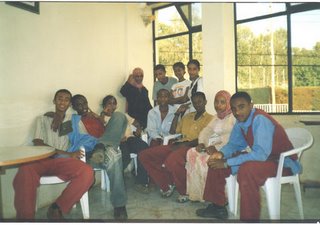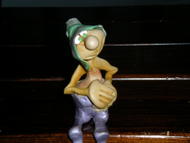Ethiopian Restaurant

That's how it is called... the ethiopian restaurant in Halifax I mean. Yesterday was my third time I had been there and my, I sure enjoyed my injera! There seems to be only two African restaurants in Halifax, and the Ethiopian Restaurant is one of them. My uncle who took me and my sister there told me there was another ethiopian eat-out along the same road but guess that didn't surivive long enough.
The Ethiopian Restaurant is really a very small place, got about 8 to 10 tables around. By the time we were half-way through, it was crowded and the waitress told us she had to send a few people away coz there were no seats. I have very little choice coz I am a vegetarian, but my sister and my uncle had choices and they decided to go with yesiga wot. "wot" in Amharic means sauce and "siga" means meat. The usual serving of the meal is having the yesiga wot poured over a spread out injera on a big platter. Injera is like a fluffed out pancake, or a really thinly spread out dosai. My serving of ethiopian-style cooked vegetables was also spread on a medium-sized platter of injera. It tasted wonderful. The usual injera is very sour because they ferment the injera dough for atleast 7 days. But here at the Ethiopian Restaurant in Halifax, it wasn't sour. Guess they made it compatible to foreign tummies. We always finish off with Ethiopian coffee, or "buna", and that is what we did this time! We had fresh buna off the "gebanah", or the coffee pot. That's the gebanah there in the pic.
Usually, people start off with an appetizer, the "sambusa". Its a triangular pastry with a stuffing, usually lentils or chicken. Its similar to the Indian "samosa", except that the spices are different and there are usually no potatoes inside the stuffing. Apart from the yesiga wot, there are options of "kai wot", a red sauce with lots of onions and a little spice, and maybe with chicken or lamb meat, "tibs", a simple meat preparation which is supposedly very good, "shiro wot", a sauce of shiro or chickpea powder, "alicha", another meat or lamb preparation which is saucy and less spicy. There is a side of "salatta", or a lettuce salad if you want it. There are more meat preparations, and since I am a vegetarian, I don't remember much. Always, always finishing off with buna indicates the completion of an ideal ethiopian meal... so it means to me! There are also options of normal tea or ginger tea too, if you are not a coffee person. Though I should mention, to me, having some ethiopian coffee is an experience in itself.
{I feel like I have written a restaurant review, though frankly, when I started writing this article, that wasn't my intention at all. Thought I should mention that... :) }


